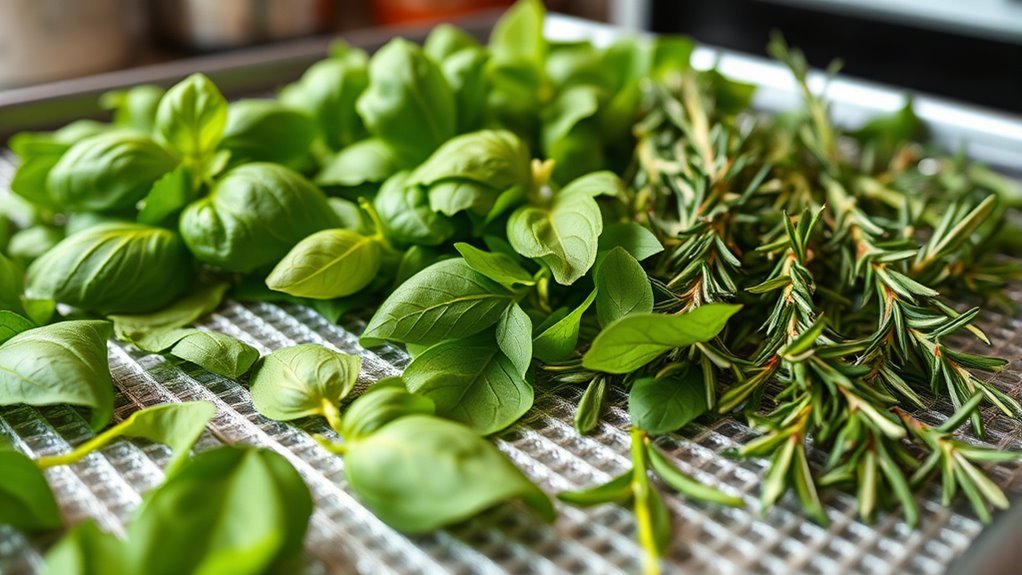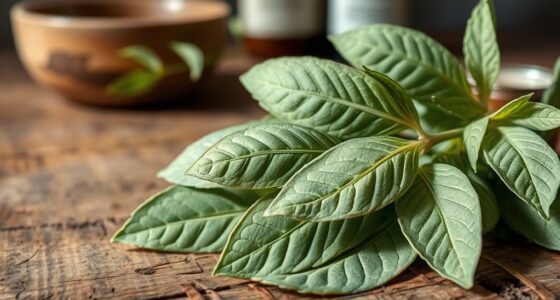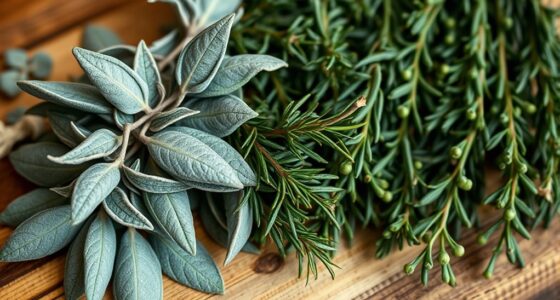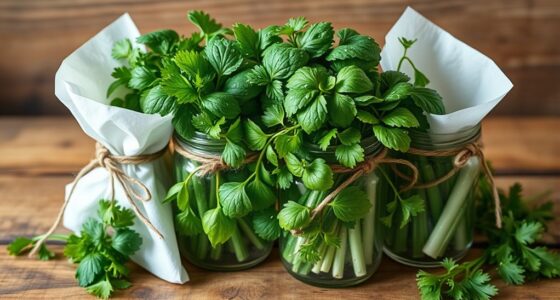To dehydrate herbs for potent DIY seasoning blends, start by choosing healthy, mature herbs and gently washing them. Hang small bunches upside down in a warm, ventilated area away from direct sunlight or use a dehydrator set between 95°F and 115°F until they crumble easily. Store dried herbs in airtight containers in a cool, dark place to preserve flavor and essential oils. Keep exploring to discover more tips for maximizing herb potency.
Key Takeaways
- Select healthy, mature herbs and wash them gently to remove dirt before drying.
- Hang herbs upside down in a warm, ventilated area away from direct sunlight to preserve flavor.
- Use dehydrators set between 95°F–115°F or low oven temperature with the door slightly open for even drying.
- Ensure herbs are completely dry before storing to prevent mold and preserve potency.
- Store dried herbs in airtight, opaque containers in a cool, dark place to maintain flavor and aroma.

Dehydrating herbs is a simple way to preserve their flavor and aroma for long-term use. If you want to keep your herbs fresh and potent for seasonings, understanding proper herb storage is essential. When herbs are dried correctly, their essential oils and flavors remain intact, ensuring your DIY seasoning blends are as vibrant as when they were fresh. The key to achieving this is to focus on flavor preservation during the drying process, which directly impacts how well herbs retain their taste and aroma over time. Proper drying techniques play a crucial role in maintaining the herbs’ potency and quality. Start by selecting healthy, mature herbs, free from blemishes or disease. Gently wash them under cool water to remove dirt and insects, then pat them dry thoroughly. Excess moisture can lead to mold or spoilage during storage, so drying herbs completely is crucial. Once dry, gather small bunches and tie them with string or use a drying rack to hang them upside down in a warm, well-ventilated area. Avoid direct sunlight, as it can degrade the herbs’ potency. This traditional method helps preserve their color, aroma, and flavor, making your herbs perfect for long-term herb storage. Additionally, proper drying methods can help prevent mold and spoilage, ensuring your herbs stay fresh longer. To further enhance the drying process, employing dehydration tools like food dehydrators can provide more consistent results. Alternatively, you can use a dehydrator or oven set on a low temperature for faster drying. When using a dehydrator, spread herbs evenly on trays, leaving space for air circulation. Set the temperature to around 95°F to 115°F (35°C to 46°C) and dry until herbs crumble easily. If you prefer an oven, set it to the lowest possible temperature, place herbs on a baking sheet, and keep the door slightly open for airflow. Regularly check to prevent over-drying or burning. Incorporating quality herbs at the start ensures the best flavor retention through the drying process. Whichever method you choose, the goal remains the same: to dry herbs without losing their essential oils, which are critical for flavor preservation. Once dried, crumble the herbs into small pieces or grind them into powder, depending on your preference. Store your dried herbs in airtight containers, such as glass jars or metal tins, and keep them in a cool, dark place. Proper herb storage prevents exposure to light and moisture, both of which can diminish flavor over time. Label your containers clearly so you can easily identify your herbal blends later on. When used in your seasoning mixes, these dried herbs will deliver concentrated flavors that elevate your dishes without the need for fresh herbs every time.
Frequently Asked Questions
How Long Do Dehydrated Herbs Retain Their Flavor?
Herb flavor retention depends on proper dehydration duration and storage. Typically, dehydrated herbs keep their flavor well for about 1 to 3 years if stored in airtight containers away from light. The dehydration duration should be enough to remove moisture without over-drying, which can diminish flavor. For the best potency, use herbs within the first year, and always check for signs of loss in aroma or color.
Can I Dehydrate Herbs in a Microwave?
You can try microwave dehydration, but be aware it’s not ideal for preserving herb quality. Using a microwave can speed up the process, but it may cause herb texture changes, making them tougher or unevenly dried. To avoid losing flavor and maintaining a good texture, it’s better to use air drying or a dehydrator. Microwaving might work in a pinch, but it’s not the best method for long-term storage.
What’s the Best Storage Method for Dried Herbs?
Storing dried herbs is like locking in sunshine after a bright day. You should keep them in airtight containers to prevent moisture and preserve flavor. Place these containers in a cool, dark place away from sunlight and heat, which can degrade quality. This method guarantees your herbs stay potent and flavorful for months, making your DIY seasoning blends even more delicious. Proper storage is key to maintaining their fresh, vibrant taste.
How Can I Tell if Herbs Are Fully Dried?
To tell if your herbs are fully dried, check for herb color change—herbs should be uniformly dull and less vibrant. Rub a small amount between your fingers; if they feel crisp and crumble easily, they’re ready. Also, note aroma loss; fully dried herbs will have a faint scent, not a strong one. If they still feel moist or smell fresh, give them more time to dehydrate completely.
Are There Any Herbs Unsuitable for Dehydration?
Imagine a home cook trying to dehydrate mugwort, unaware of its potential toxicity. Some herbs, like deadly nightshade or certain toxic herbs, are unsafe for dehydration because they pose herb safety risks. Toxic herbs can retain harmful compounds even after drying, making them unsuitable for seasoning blends. Always identify herbs carefully and avoid dehydrating any that are known to be toxic or have uncertain safety profiles.
Conclusion
Now that you know how to dehydrate herbs, you can create your own potent seasoning blends at home. Did you know that properly dried herbs retain up to 90% of their flavor and nutrients? By dehydrating herbs yourself, you not only save money but also verify you’re using fresh, vibrant ingredients in your cooking. So get started, experiment with different herbs, and enjoy the rich flavors that your DIY seasonings bring to every meal!









